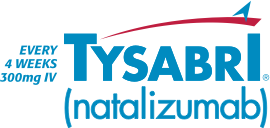TYSABRI OFFERS POWERFUL EFFICACY
Patients demonstrated statistically significant results, as evidenced by key parameters in the 2-year AFFIRM trial1
AFFIRM study description: The AFFIRM (NAtalizumab Safety and EFFIcacy in Relapsing-Remitting MS) study was a pivotal 2-year, double-blind, randomized, controlled trial with 942 RMS patients who received either TYSABRI® (natalizumab) therapy (300 mg by intravenous infusion [n=627]) or placebo (n=315) every 4 weeks for up to 28 months (30 infusions).1-3
- Exclusion criteria included patients with primary progressive, secondary progressive, or progressive relapsing MS
- The primary endpoint at 2 years was time to onset of sustained increase in disability, defined as an increase of ≥1.0 point on the EDSS from a baseline of ≥1.0 that was sustained for 12 weeks, or a ≥1.5-point increase on the EDSS from a baseline EDSS of 0 that was sustained for 12 weeks. Increases excluded disability confirmation within 30 days of a relapse
Baseline characteristics of patients in the AFFIRM trial1,2
~94% of patients in the 2-year AFFIRM pivotal trial were treatment-naive to platform therapya
- 5 years median disease duration
- Most patients had ≥1 relapse in the previous year
- EDSS score 0-6.0 (mean: 2.3)
- 37 years median age
aPlatform therapy with interferon-beta and glatiramer acetate. The remaining 6% did not receive these agents for ≥6 months before the study period.1
